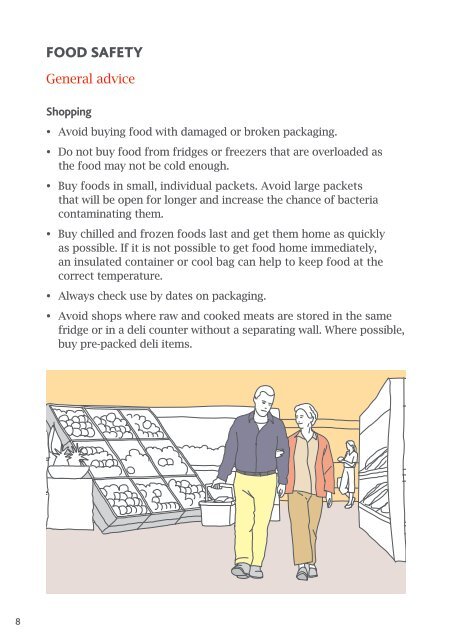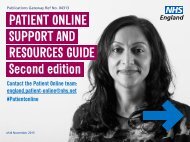Dietary advice for haematology patients with neutropenia
28InHbV
28InHbV
Create successful ePaper yourself
Turn your PDF publications into a flip-book with our unique Google optimized e-Paper software.
FOOD SAFETY<br />
General <strong>advice</strong><br />
Shopping<br />
• Avoid buying food <strong>with</strong> damaged or broken packaging.<br />
• Do not buy food from fridges or freezers that are overloaded as<br />
the food may not be cold enough.<br />
• Buy foods in small, individual packets. Avoid large packets<br />
that will be open <strong>for</strong> longer and increase the chance of bacteria<br />
contaminating them.<br />
• Buy chilled and frozen foods last and get them home as quickly<br />
as possible. If it is not possible to get food home immediately,<br />
an insulated container or cool bag can help to keep food at the<br />
correct temperature.<br />
• Always check use by dates on packaging.<br />
• Avoid shops where raw and cooked meats are stored in the same<br />
fridge or in a deli counter <strong>with</strong>out a separating wall. Where possible,<br />
buy pre-packed deli items.<br />
Storage<br />
• Keep your fridge between 0°C and 5°C.<br />
• Keep your freezer below -18°C. Always make sure that food is still<br />
frozen solid when you take it out of the freezer.<br />
• Store cooked food at the top of the fridge.<br />
• Store raw or defrosting meat or fish at the bottom of the fridge in<br />
a covered container to stop it dripping or leaking into the fridge.<br />
• Do not overload your fridge or freezer as this will increase<br />
the temperature.<br />
• Keep eggs in the fridge.<br />
• Use and store food following manufacturers’ instructions and<br />
<strong>with</strong>in best be<strong>for</strong>e or use by dates.<br />
• Never refreeze thawed food.<br />
USE BY : OCT 12<br />
Food preparation<br />
• Always wash your hands <strong>with</strong> warm water and soap be<strong>for</strong>e<br />
preparing food.<br />
• Wash your hands after going to the toilet, sneezing and after<br />
touching pets, hair, dirty washing, rubbish, ready-made or raw food.<br />
8 9




